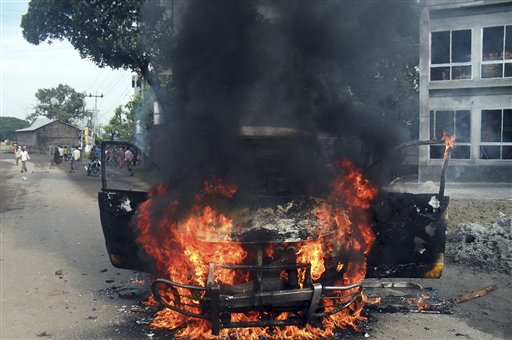(AP) 4 die in opposition strike violence in Bangladesh
By JULHAS ALAM
Associated Press
DHAKA, Bangladesh
Bangladesh’s opposition alliance enforced a nationwide strike Monday marred by violence that killed four people, after the prime minister refused calls to form a caretaker government that excludes political parties.
The 18-party opposition alliance led by Khaleda Zia began the three-day general strike on Sunday to force the government of Prime Minister Sheikh Hasina to quit and have a caretaker oversee an election scheduled to be held by early next year.
The opposition has threatened to boycott the election unless a caretaker is appointed from outside of political parties, as has been the practice in the past. Hasina has proposed forming a caretaker government from ruling and opposition parties to supervise the vote.
TV stations reported that scores were injured in clashes nationwide, in which at least 15 people have died since Friday.
A man from the ruling Awami League party was stabbed to death Monday by opposition supporters who tried to stop vehicles from defying the shutdown in the central district of Jamalpur, police said.
A driver died in an attack in southeastern district of Chittagong, a local leader of the main opposition Bangladesh Nationalist Party was killed in a bomb attack, and a teenager died in clashes between government and opposition activists.
At least 50 people were injured when a train derailed in northern Lalmonirhat district as strike supporters uprooted the rail line, Channel 24 TV station reported.
In Dhaka, opposition supporters torched a ruling party office, while schools and businesses remained closed.
The caretaker system of forming a government that excludes political parties has been used for 15 years, but the Supreme Court ruled it unconstitutional. The opposition blames the government, accusing it of trying to rig the vote. The government denies the charge.
Zia refused an invitation by Hasina, her archrival, to discuss the political tensions and a request to stop the strike when the two spoke by phone Saturday. But she said she would consider it after the strike ends Tuesday.
Bangladesh, a parliamentary democracy, has been alternately ruled by Hasina and Zia since 1991. But the issue of peaceful transfers of power has remained a major challenge.

COMMENTS
Please let us know if you're having issues with commenting.